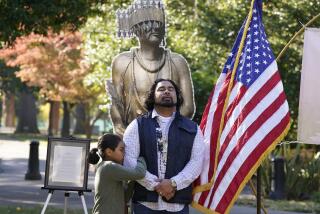Tribes get more power to handle domestic violence cases
- Share via
TUCSON — During his 18 years with the Pascua Yaqui Police Department, Michael Valenzuela repeatedly grew frustrated when responding to reports of domestic violence.
If the aggressor wasn’t a tribal member, the best Valenzuela could do was drive the man to the edge of the reservation, let him out and tell him to stay away from his wife or girlfriend.
Valenzuela, police chief of the Pascua Yaqui Tribe, said he resorted to the tactic several dozen times because he couldn’t legally arrest non-tribal members suspected of assault on the tribe’s land.
“Can you imagine responding to call where there is clear evidence of a crime committed by an individual and you cannot arrest them? I think the community felt cheated,” he said. “It made police officers and victim advocates feel powerless.”
That’s why, Valenzuela said, he’s eager to start a pilot program with federal officials aimed at combating domestic violence in Indian country.
On Thursday, officials with the U.S. Justice Department announced that the Pascua Yaqui Tribe and two others — the Umatilla Tribes of Oregon and Tulalip Tribes of Washington — would be the first in the nation to be allowed to arrest and prosecute non-tribal members on suspicion of crimes of domestic violence and dating violence occurring on Indian land.
The new project — provided by the Violence Against Women Reauthorization Act of 2013 — is an important new tool for the tribes, Atty. Gen. Eric H. Holder Jr. said in a statement.
Holder called the project a significant victory for public safety and a step forward for tribal sovereignty and self-determination. “Every day, we’re working hard to strengthen partnerships with tribal leaders and confront shared challenges — particularly when it comes to protecting Indian women and girls from the shocking and unacceptably high rates of violence they too often face,” he said.
The annual average rates for aggravated and simple assault among American Indians were more than double the rates for the nation, according to a 2004 Justice Department study. In addition, the rate of violent crime committed against Native American females was more than double the rate for all U.S. females, according to the same study.
Domestic violence cases account for 50% of criminal filings in tribal courts on the Pascua Yaqui reservation. Not all involve non-tribal members, but their presence is an issue, said Amanda Lomayesva, attorney general for the tribe.
“It’s a significant problem, and because we’re so close to Tucson, we do have a lot of non-Indians on the reservation.”
Although the provisions authorizing the special jurisdiction will take effect in March 2015, the law also gives the U.S. attorney general’s office discretion to grant a tribe’s request to exercise the jurisdiction earlier, through a voluntary pilot project, federal officials said.
The Pascua Yaqui Tribe plans to start its program Feb. 20, Valenzuela said.
Nearly 5,000 people live on the reservation, about 500 of them non-tribal members. When Valenzuela drove suspected abusers away from their homes, there was only so far he could take them. The reservation southwest of Tucson covers about 2 square miles. All too often, abusers would return to their victims.
Tony West, associate U.S. attorney general, said the old jurisdictional scheme that prevented tribal police from arresting abuse suspects failed to adequately protect the public — particularly Native American women.
“Our actions today mark a historic turning point,” West said.
The issue stemmed from a 1978 Supreme Court opinion that prohibited tribes from exercising criminal jurisdiction over non-tribal defendants. This included domestic violence and dating violence committed by non-Indian abusers against their Indian spouses, intimate partners and dating partners.
Even a violent crime committed by a non-Indian husband against his Indian wife — in the presence of her Indian children and in their home on the Indian reservation — could not be prosecuted by the tribe.
In most cases, Valenzuela said, his officers would ask federal officials to file charges, but that rarely came to pass — and only in the most violent of cases.
Peter Yucupicio, tribal chairman for the Pascua Yaqui Tribe, said stopping violence against Native American women is a top priority.
“Our judicial system, like all other judicial systems, will now have the opportunity to address offenders for wrongs committed against our most vulnerable community members,” Yucupicio said. “We no longer have to simply stand by and watch our native women be victimized with no recourse.”
More to Read
Sign up for Essential California
The most important California stories and recommendations in your inbox every morning.
You may occasionally receive promotional content from the Los Angeles Times.











